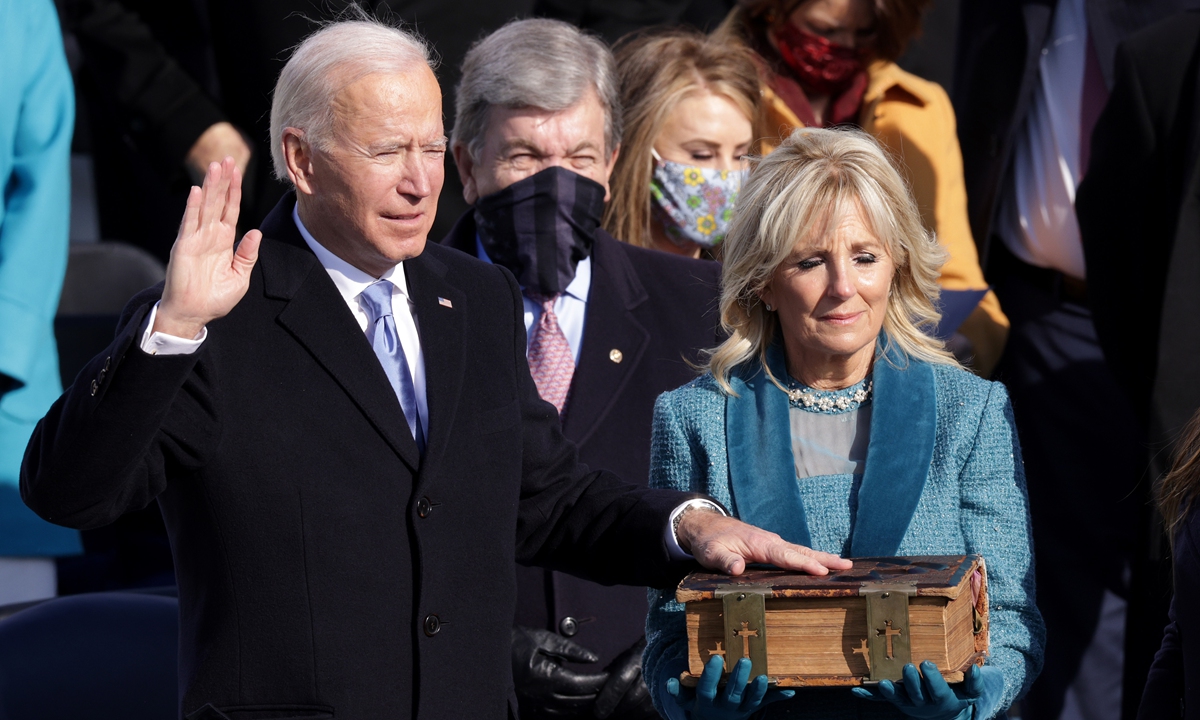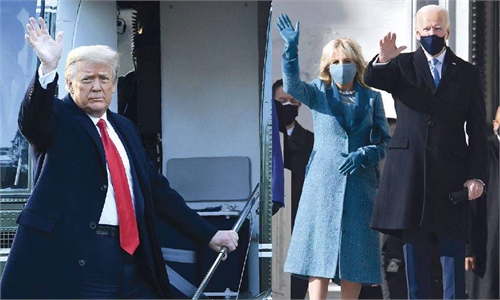
Joe Biden Photo:AFP
Joe Biden was inaugurated as the 46th US president on Wednesday. Several members of his team on Tuesday hinted that they would maintain a tough line toward China.
Antony Blinken, Biden's secretary of state, said he believed Trump was right in taking a tougher approach to China. Treasury Secretary nominee Janet Yellen said the Biden administration is prepared to use the "full array of tools" necessary to curb China's so-called economic malfeasance. Avril Haines, now confirmed by Senate as director of national intelligence, promised to "provide the necessary intelligence to support long-term bipartisan efforts to out-compete China."
How to interpret these remarks?
First, they showed their collective hard-line stance over China as they were attending Senate confirmation hearings - hence they must cater to the mainstream views of most senators. Hard-line stances on China have prevailed in the US Congress in recent years. In this context, in a bid to obtain confirmation and recognition by the Senate, these nominees' narratives on China must not be inconsistent with senators.
Second, Trump's China policy legacy has remarkably poisoned domestic awareness and perceptions toward China. It has forged a strong anti-China political atmosphere. These nominees' rhetoric also pandered to such domestic sentiments toward China.
China is a country with different values from the US, and many American political elites believe it has been steadily narrowing its gap with the US and thus posed grave challenges to US global leadership.
Haines also mentioned that it would be a priority to "counter" Beijing's "human rights violations." It is expected that Biden will pile more pressure on China's human rights records. Since the two countries established official ties, human rights have become a card for Washington to play against China. Focusing on values is a characteristic of Democratic presidencies, and we can expect the Biden administration to continue to attach importance to human rights agendas in dealing with China.
When it comes to the Taiwan question, Blinken said he was in favor of greater engagement with the island and would like to see the island play a greater role around the world. Biden is anticipated to deal with the Taiwan question in a way that serves US national interests. Showing tough stance on China in terms of the Taiwan question may still happen, but Biden clearly acknowledges where the bottom-line is. He will not push the US to become a helper to realize Taiwan secession.
In terms of trade, Biden will not follow Trump's path. The trade war launched by Washington has widened the US' trade deficit with China and ordinary Americans have paid huge prices. Yellen said Washington must work with allies to confront Beijing, which sounds pretty unachievable. US allies are clearly aware of the US' severe political divisions, and how sick US economy is. These countries may not follow the US' lead in dealing with China on the economic front.
Although members of Biden's team have tough narratives, it still remains unclear how its China policy will be implemented. To tackle many urgent domestic and international problems, cooperation with China is essential for the Biden administration. It will most likely be pragmatic and flexible in coping with China. With some agendas, compromise may become inescapable. Whereas Biden and his team have rich diplomatic experience and deep understanding of China and Asia, their policies toward China will be more rational.
For example, Biden said in December that the epidemic fight will be his priority up taking office and he has appointed a new coordinator on day one to address this. In managing and controlling the spread of the epidemic, Biden's team needs to cooperate with China.
Apart from that, in order to achieve revival of domestic economy, resolve the climate change, and tackle nuclear issues with Iran and North Korea, coordination with China will be necessary.
In conclusion, the Biden administration's China policy is projected to be a mixture of tough narratives with pragmatic and flexible moves.
At the initial stage of the Biden administration, China policy will be adjusted in the aftermath of evaluation of the policies of its predecessor. But it will not completely overturn and reconstruct them. It remains to be seen how much will be adjusted. However, there will certainly be an approach that is significantly different from Trump's.
The author is professor at the Institute of International Relations of the China Foreign Affairs University. opinion@globaltimes.com.cn

